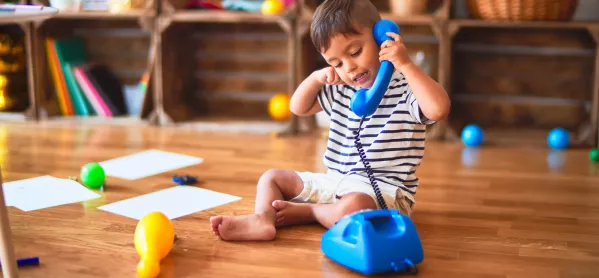The pandemic is having a negative impact on early years children’s language development, especially those from disadvantaged backgrounds, MPs have been told.
In a meeting of the Commons’ Education Select Committee today on the under-attainment of white disadvantaged pupils, experts told MPs that children in poorer communities were struggling to develop language skills because of the impact of the coronavirus lockdown.
Ofsted: How to do remote learning ‘well’
First lockdown: DfE sets out best practice for remote learning
Coronavirus: What schools need to know about the new legal duty to provide remote learning
Claire Smith, Talk Halton project lead at Halton Borough Council, said: “The impact [of lockdown] on children’s language and communication development, socialisation, being able to make friends, doing all those really important social and emotional aspects, practising their emerging language development, having the impact of peers to support their language development, all of that has been really massively missing.
Coronavirus: The impact on early language development
“And although early years settings are now open, which is really important as a basis, children have missed out on so much within this last year.”
And Louisa Reeves, head of impact and evidence at the children’s communication charity I CAN, said that disadvantaged children were struggling most.
“In early years, children in areas of disadvantage, we’re seeing the impact across our projects in areas of disadvantage...where we’re working, particularly at the moment in terms of that lack of the to-and-fro-ness of communication, the ability to build vocabulary and to have those external experiences that help you build your language.”
Ms Reeves said the pandemic was particularly hitting the social skills of boys in all age groups.
“I think the issues raised around boys and learning styles is also seen in communication, so particularly for adolescent boys, they need to have that peer group interaction - there’s a lot of socialising that children are missing out on at the moment across the age range and I think that’s going to have a huge impact not only in terms of their wellbeing at the moment but in terms of their ability to form relationships, to work together, to have all of those soft communication skills that we look for in the workforce, particularly in the 21-first century.”
“More boys than girls have communication difficulties, so that needs to be a massive focus from my point of view,” she added.
“In the learning environment, they’re more predisposed than girls to have learning difficulties anyway because they often have underlying speech and language needs that are not met adequately. So that needs to be a focus when children get back to school is ensuring they have the communication they need to succeed.”
